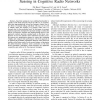88 search results - page 11 / 18 » Goal-driven opportunistic sensing |
GLOBECOM
2007
IEEE
14 years 1 months ago
2007
IEEE
— Spectrum sensing is a key enabling functionality in cognitive radio (CR) networks, where the CRs act as secondary users that opportunistically access free frequency bands. Due ...
ICASSP
2010
IEEE
13 years 7 months ago
2010
IEEE
Vast segments of the frequency spectrum are licensed to specific users for particular applications. These legacy users, however, often under-utilize their designated spectrum seg...
INFOCOM
2009
IEEE
14 years 2 months ago
2009
IEEE
—In cognitive wireless networks where secondary users (SUs) opportunistically access spectral white spaces of primary users (PUs), there exists an inherent tradeoff between sensi...
ICASSP
2010
IEEE
13 years 7 months ago
2010
IEEE
One of the key problems in cognitive radio (CR) is the detection of primary activity in order to determine which parts of the spectrum are available for opportunistic access. This...
GLOBECOM
2007
IEEE
14 years 1 months ago
2007
IEEE
Abstract—We explore the performance tradeoff between opportunistic and regulated access inherent in the design of multiuser cognitive radio networks. We consider a cognitive radi...

